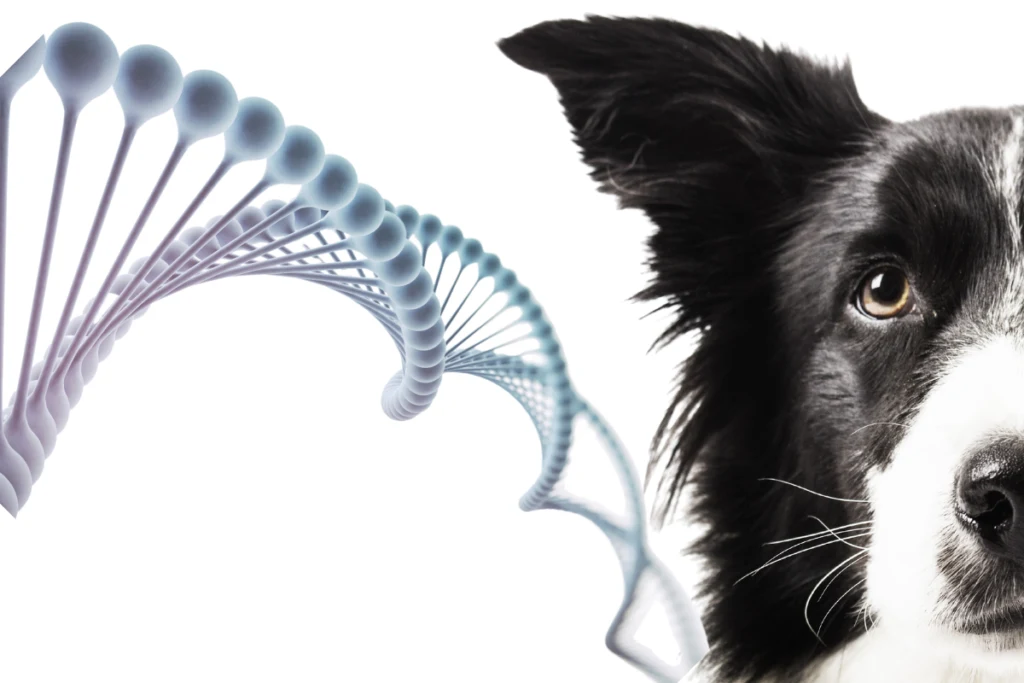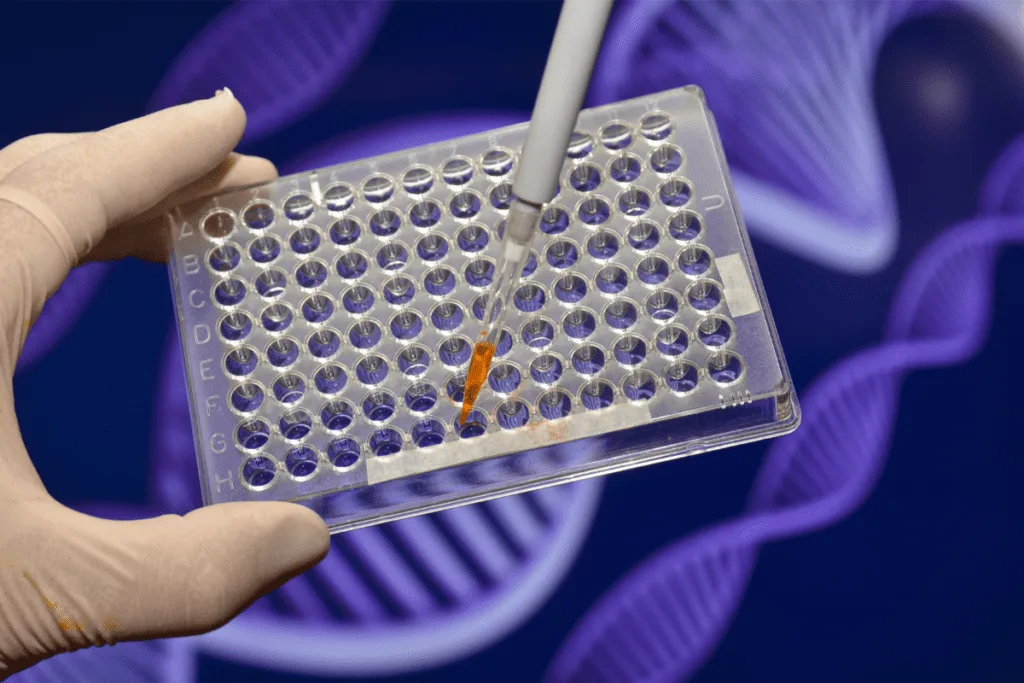Mapping DNA is considered one of the milestones of science, a pinnacle of achievement, yet it remains largely irrelevant to most dog owners.
Why should you test your dog’s DNA? Are the results of DNA testing relevant to your dog’s everyday life? Do the results have a practical application?
Pet Owners should test their dog’s DNA so that they can take proactive steps to ensure their dog has a healthy, fulfilling life. Ethical breeders test their dog’s DNA to ensure the continued health and improvement of the breed. Embark is our number one recommendation for reliable dog DNA testing.
DNA is the instruction manual behind every living organism; it governs our health, looks, and behavior. Testing your dog’s DNA gives you insight into the “behind the scenes” instruction manual that created the dog your dog is today.

Which Owners Should Test Their Dog’s DNA?
You may be reading this article wondering if DNA testing would be helpful for you and your dog.
Maybe your dog is a mutt or crossbreed; everyone knows (or at least assumes) that crossbreeds are healthy.
What benefit would DNA health testing offer your dog! Or perhaps you’ve got a purebred dog from a well-respected breeder; wouldn’t the breeder have done all the genetic testing needed?
Truthfully, both these owners can get something from DNA testing their dogs. The four types of owners who can benefit from DNA testing include:
- Pet owners of mixed-breed dogs
- Pet owners of purebred dogs
- Ethical breeders
- People who are buying a dog to perform a specialized job based on its parent’s performance in the same field, e.g., a gundog
Why Should Pet Owners Test Their Dog’s DNA?
You may be looking at your mixed breed pup, wondering what your next 10 to 15 years will be like.
Getting a mixed breed dog is akin to a lucky packet surprise; you are never quite sure how big, active, or shy your mixed breed dog will be.
Pet owners of purebred dogs will benefit from parental verification and health testing. There is no need for a purebred dog owner to conduct breed determination DNA tests; they already know what breed their dog is!
Pet Owners Should DNA Test Their Dogs To Determine Parentage
For owners of mixed-breed dogs, DNA testing gives insight into the breeds which make up your dog’s ancestry.
Understanding what breeds contributed to your “lucky packet surprise” allows you to ensure that your dog’s needs (i.e., physical and mental) are met according to the dominant breed making up your dog’s ancestry.
Most shelters and animal rescue organizations do not have the resources to do DNA testing on puppies.
However, DNA testing on mixed breed puppies would ensure shelter puppies are placed in compatible homes and increase the number of successful adoptions.
DNA testing allows you to verify parentage for owners of purebred dogs, an important consideration when breeding dogs or buying a dog based on their pedigree.
Pet Owners Should Do DNA Health Testing On Their Dogs
In addition to this, health testing offers important benefits for mixed-breed and purebred dogs.
According to American Kennel Club (AKC) regulations, many purebred dogs are susceptible to breed-specific conditions that are not subject to compulsory testing.
The breeder may not have tested the dog for that specific condition as they were not required to do so by the AKC.
However, just because a dog is purebred does not guarantee it will have that specific health condition; therefore, testing is important.
Dogs with uncertain parentage do not get a “get out of jail free card” for heritable health conditions.
First-generation cross breeds are less susceptible to health conditions caused by recessive genes.
However, all crossbreeds are just as vulnerable as purebred dogs to health conditions caused by dominant genes and polygenic inheritance.
Why Do Breeders Need To Test Their Dog’s DNA?

Ethical breeders should test their dog’s DNA for three reasons:
- Verify parentage
- Inbreeding coefficient
- Genetic diseases
A Wise Breeder Always Uses DNA Testing To Verify Parentage
The first reason is perhaps the most obvious. When breeding purebred dogs, a dog’s parentage and pedigree are everything.
Both ethical and unethical breeders have accidentally or intentionally misrepresented a puppy’s parentage.
Many breeders run multi-dog packs, and occasionally, accidents happen.
A spouse may have accidentally let a bitch in heat out with the other dogs before placing her back in her pen.
The spouse may have failed to disclose the bitch’s escapades to avoid a marital dispute, thinking that no accidental matings occurred.
In this case, an ethical breeder may unintentionally misrepresent a future breeding dog’s parentage.
A wise breeder will always verify their dog’s pedigree regardless of whether they bred the puppy themselves or purchased it from another breeder.
An unethical breeder may deliberately misrepresent their puppy’s parentage to charge a higher price or get rid of an unwanted puppy.
Breeders Should DNA Test For An Inbreeding Coefficient
The second reason breeders should test their dog’s DNA is to ascertain the genetic inbreeding coefficient of a particular mating.
Many dog breeds were created by breeding back to a common ancestor. These practices increase the predictability and consistency of desirable breed traits.
However, line-breeding leads to a loss of vitality and vigor. When there is a high degree of inbreeding, the dog breed will exhibit increased mortality, smaller litter sizes, decreased birth weight, and increased incidence of heritable disorders.
The inbreeding coefficient refers to the probability of a dog inheriting two copies of the same allele from a common ancestor found in both its maternal and paternal lines.
These alleles are said to be identical by descent and increase the homozygosity of a specific dog.
A pedigree-based calculation of the inbreeding coefficient allows breeders to determine the probability of the dog’s degree of inbreeding.
However, DNA testing enables breeders to assess the genetic inbreeding coefficient more accurately.
The genetic inbreeding coefficient is the “real life” result of inbreeding and not the “guesstimate” obtained in pedigree-based calculations.
The Institute of Canine Biology advises that an inbreeding coefficient of less than 5% generally has no ill effects on the dog. An inbreeding coefficient of 5% to 10% produces moderately adverse effects.
An inbreeding coefficient of greater than 10% causes a significant loss of vitality.
A dog breed with an inbreeding coefficient of greater than 10% has entered the “extinction vortex,” i.e., the breed will not survive without human intervention due to the high rate of mortality and low fertility.
Breeders Are Duty-Bound To DNA Test For Heritable Conditions

Upliftment of a breed is more than just ensuring that your breeding dogs comply with the AKC standards for physical characteristics and temperament traits.
Upliftment and protection of a breed mean ensuring that most dogs within a specific breed are healthy and that future generations are viable.
Many uneducated, new, or cash-strapped breeders assume that if their dog is healthy at the time of breeding, it is safe to breed with them even if they have not done DNA testing.
However, many heritable conditions, like Lafora’s disease, myoclonic epilepsy, and Syringomyelia, are late-onset conditions occurring at 3 to 7 years of age.
At 3 to 7 years of age, most breeding dogs would have already had 1 to 5 litters and may have passed on those “unhealthy” genes to their puppies.
In addition to late-onset conditions, breeders may fail to identify dogs who are carriers of recessive genes linked to specific health conditions unless DNA testing is performed.
Dogs who have one copy of the problematic gene will not be affected by a recessive health condition.
However, these dogs are carriers and can pass the gene onto their puppies. If two carrier dogs are bred together, 25% of the puppies will be homozygous (i.e., carrying two copies of the gene) for the recessive gene and will be affected by the heritable condition.
Breeders may advertise their dogs as being clear by DNA testing or by parentage. If dogs are marketed as clear by parentage, this means that the breeder has copies of the parents’ DNA results proving that the parents tested free for the heritable condition.
Why Does The AKC Have Voluntary And Mandatory DNA Testing?
To register a puppy with the AKC, breeders must comply with breed-specific health testing. Depending on the breed, health testing may include:
- DNA testing
- X-rays
- MRI scans, blood tests
- Veterinary examinations of cardiac, kidney, and other body system’s function
Most companies offering DNA testing for health conditions can test for more than 1800 conditions. However, testing a dog for more than 180 conditions is exhausting and financially draining.
The AKC requires breeders to test for health conditions that have exceeded the acceptable incidence threshold as determined by the national parent club. Breeders are not required to test for:
- Health conditions that do not occur within a particular purebred dog population
- Health conditions that are both mild and rare
However, breeders may choose to voluntarily “go the extra mile” and perform additional DNA tests for rare or unusual conditions.

The AKC requires mandatory DNA Parentage tests for:
- Imported breeding stock.
- Frequently used sires.
- Puppies whose dam was inseminated by Artificial Insemination in which the semen is collected for fresh-extended or frozen use.
- Sires, dams, and puppies for multiple-sired litter registration, i.e., a bitch mated with multiple males.
For all other dogs, DNA parentage tests are voluntary. However, the AKC recommends that breeders perform DNA parentage tests as a value-added service for prospective puppy buyers.
To have your dog’s DNA profile registered with the AKC, DNA testing needs to be done through the AKC. Breeders interested in profiling their dog’s DNA can contact the AKC, which will then send a DNA test kit to the breeder.
Can You Trust Dog DNA Tests?
Most companies who offer dog DNA testing to the public trade on the dog owners’ concern for their pet and lack of knowledge surrounding DNA science.
These companies have strong marketing campaigns based on their trustworthiness, scientific validity, and honesty.
However, Dr. Karlsson, a professor at the broad institute of MIT and Harvard, cautions that these companies may have “jumped the gun” in making the science accessible to the public.
DNA testing for dogs is a relatively new field of study that holds a lot of promise for the future.
Unlike humans, there are multiple breeds of dogs. Thus, the genetic variability is substantially greater than that found in humans, i.e., more work has to be done before the majority of “dog” genes can be reliably tested for.
In addition to this greater degree of variability, genetic sequencing for specific hereditary conditions is not as straightforward as it initially appears.
Many genes associated with an inherited condition are correlative and not causative genes.
For example:
Dogs with white markings controlled by the MITF gene often suffer from sensorineural deafness. Many people mistakenly assume that the MITF-linked white markings cause deafness in dogs. However, this assumption is erroneous.
Not all dogs with MITF white makings suffer from deafness. Indicating that the MITF gene is not responsible for sensorineural deafness in dogs.
Although the MITF gene does not cause deafness, there is a high probability that the MITF gene is located in the same chromosomal region as the gene(s) for deafness.
Thus, MITF white markings and deafness are correlated but not causative of each other.
Is The New Science Of Dog DNA Tests Valuable To The Public?

Although the science of Dog DNA tests is relatively new, the general public (i.e., you and I) can still make use of the DNA tests that are currently available.
However, the actions and decisions based on the results must be guided by practicality and common sense.
Your dog’s DNA tests can have profound implications for the rest of their lives. It is essential that when you interpret the results of your dog’s DNA tests, you do so with an understanding of the reliability and possible interpretations of the DNA test results.
The implications and reliability of the most common DNA tests:
- Parental verification: high reliability, serious implications
- Inbreeding coefficient: moderate reliability, serious implications
- Breed composition in crossbreeds: low reliability, minimal implications
- Color genotyping: relatively high reliability, minimal implications
- Hereditary disease testing: low to high reliability, moderate to serious implications
What Weight Should You Give The Results Of A Dog’s DNA Test?
Verifying a dog’s parentage, inbreeding coefficient, and color genotype are important for breeders as they determine the value of the dog and which dogs can be bred together.
These tests have a relatively high degree of reliability, and it is safe for the breeders to interpret the results of the tests if they are carried out through the AKC testing services.
Breed composition in crossbreed dogs is notoriously difficult to determine with a high degree of accuracy.
It is almost impossible to test which breed contributed to creating a crossbreed dog with a greater than 5% accuracy.
It is relatively common for owners to get two different results for a breed composition DNA test if they submit their dog’s DNA more than once.
Typically, the dominant breeds contributing to the crossbreed dog’s genotype remain the same; however, the percentages may vary.
While the DNA tests for breed composition in crossbreed dogs are relatively unreliable, the consequences for the dog and owner are minimal.
These DNA tests are interesting exercises that can provide insight into your dog’s needs and behaviors.
However, an experienced dog behaviorist can be equally helpful in offering practical advice on managing and influencing a dog’s behavior regardless of breed.
Be Cautious When DNA Testing Your Dog For Genetic Conditions!
Perhaps the most impactful dog DNA test which can be carried out is tests for hereditary diseases. Genetic disease testing will determine:
- Whether it is ethical to breed with a dog.
- What, if any, preventative actions can be taken.
- How the owner thinks and feels about their dog.
Genetic disease testing and interpretation of the results should always be performed in consultation with a veterinarian.
The veterinarian will be able to advise owners on the reliability of the test results (i.e., some DNA tests for specific genetic conditions are more reliable than others) and the implications of these results.
Owners who interpret the DNA results without the assistance of a veterinarian or geneticist may wrongly assume that a “worst-case scenario” is guaranteed.
For example:
Many genetic tests are available for various cancers found in dogs.
Owners may feel that their dog’s fate is sealed if the DNA test results are positive for cancer genes. However, a positive test result does not guarantee that your dog will develop cancer in the future.
The epigenetics of cancer genes means that many cancer genes will remain dormant unless switched on by specific environmental conditions.
In these cases, a veterinarian will be able to counsel the owner as to the risk of cancer and what proactive steps the owner can take to prevent these genes from being switched on.
How Do You Test Your Dog’s DNA?

Most home DNA kits use buccal (cheek) swabs to obtain a sample of DNA. However, a few companies require owners to send in a blood sample from their dog.
Companies utilizing a buccal swab will send a Q-tip swab with a sealable test tube for the owners to use. The specific instructions may vary, but the general mechanics remain the same.
To obtain a buccal swab, owners should follow the steps outlined below:
- Put on sterile medical gloves to prevent your DNA from contaminating your dog’s DNA sample.
- Open the test tube, setting the cap down with the inside of the cap facing upward. The test tube should be standing upright.
- Open the Q-tip package at the stick end, not near the Q-tip. Once opened, grab the end of the stick and gently extract the swab being careful not to touch or contaminate the Q-tip.
- Place the Q-tip in your dog’s mouth and gently rub all sides of the Q-tip against your dog’s cheek. The Q-tip should be thoroughly coated with saliva and loose cheek cells.
- Take the swab out of your dog’s mouth and place it into the test tube. Seal the test tube, mark it as belonging to your dog and send it to the company for testing.
If the company requires a blood sample, it is best to take your dog to the veterinarian to have their blood drawn.
When conducting parental verification tests, always check the official organization’s rules for sample collection.
Some breed organizations and governing bodies will only acknowledge the results if the sample is collected by a veterinarian, veterinary nurse, or animal health technician.
What Companies Offer DNA Testing For Dogs?
Numerous companies are offering various DNA testing services for dogs. However, the top three companies are:
Although Wisdom and Orivet are reputable companies, Embark remains our number one recommendation due to the following services they offer:
- Embark tests for more than 200,000 genetic markers, more than any other company currently offering dog DNA tests.
- Embark is a research partner of Cornell College of Veterinary Medicine and participates in and often funds research into Dog DNA sequencing.
- Embark claims that they offer the most accurate DNA testing and guarantee a 99% accuracy for mutation tests and most linkage-based tests.
- Early notification of alarming test results
- Consultation with the owner’s veterinarian of choice
- Embark has a qualified geneticist on staff who is available for consultation with breeders, owners, and veterinarians who need assistance with interpreting the results of the dog’s DNA tests.
- In addition to this, Embark provides access to a database on dog relatives allowing owners of related dogs to connect and chat with one another.
Critiques of Embark often complain about the high prices and slow delivery times; however, few reviews question the validity of Embark’s results.
What Products Does Embark Offer Dog Owners?
Embark has three categories of products for owners, breeders, and veterinarians.
For owners, Embark offers:
- A purebred kit that includes:
- Tests for more than 210 health conditions
- Measures genetic diversity, i.e., inbreeding coefficient
- Tests for more than 35 physical traits
- Ancestry tests (i.e., parentage) up to the fourth generation (i.e., great grandparents) and relative identification.
- A breed kit that includes:
- Tests for genetic markers from more than 350 dog breeds
- Ancestry tests (e.g., parentage) up to the fourth generation (i.e., great grandparents) and relative identification.
- A breed plus health kit that includes:
- Tests for more than 210 health conditions
- Tests for genetic markers from more than 350 dog breeds
- Measures genetic diversity, i.e., inbreeding coefficient
- Tests for more than 35 physical traits
- Ancestry tests (e.g., parentage) up to the fourth generation (i.e., great grandparents) and relative identification.
Final Thoughts
While all dog owners can benefit from testing their dog’s DNA, the results should be interpreted with caution, as not all DNA tests are fully reliable.
Genetic disease testing, parental verification tests, and inbreeding coefficient (i.e., genetic diversity tests) are valuable tools for owners and breeders alike.
It is advisable to seek veterinary assistance when interpreting the results of these DNA tests, especially if there is a positive test result for a serious hereditary health condition.
